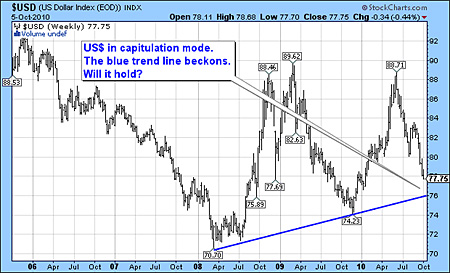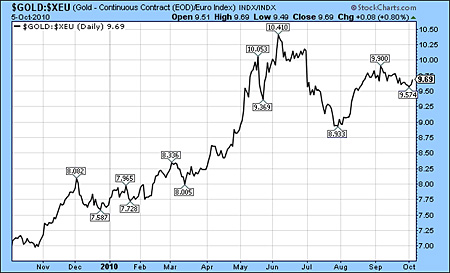When will gold's latest surge end?
It's been an amazing couple of months for precious metals, with the prices of both gold and silver hitting new highs – in dollar terms at least. But what's behind gold's latest rally? And what could bring it to an end? Dominic Frisby investigates.
Get the latest financial news, insights and expert analysis from our award-winning MoneyWeek team, to help you understand what really matters when it comes to your finances.
You are now subscribed
Your newsletter sign-up was successful
Want to add more newsletters?

Twice daily
MoneyWeek
Get the latest financial news, insights and expert analysis from our award-winning MoneyWeek team, to help you understand what really matters when it comes to your finances.

Four times a week
Look After My Bills
Sign up to our free money-saving newsletter, filled with the latest news and expert advice to help you find the best tips and deals for managing your bills. Start saving today!
Gold and silver have broken out to new highs yet again. It seems to be happening almost every day now.
Yesterday, gold broke new records, closing in the US at $1,340 per ounce, while silver is now through its 2008 peak, closing at $22.80 an ounce, also an all-time high, except for a few crazy days in 1980.
In short, it's been an amazing couple of months for precious metals. So where is it all going to end?
MoneyWeek
Subscribe to MoneyWeek today and get your first six magazine issues absolutely FREE

Sign up to Money Morning
Don't miss the latest investment and personal finances news, market analysis, plus money-saving tips with our free twice-daily newsletter
Don't miss the latest investment and personal finances news, market analysis, plus money-saving tips with our free twice-daily newsletter
While the dollar keeps falling, gold will keep rising
These new highs in gold and silver are as much a function of US dollar weakness as anything else. The US dollar is capitulating. In barely six trading days it has fallen from 83 on the index (measuring the dollar against a basket of other major currencies) to 77.75.
It looks as though we're going to at least test the blue trend line that I have drawn on the chart below. If that doesn't hold, I daresay we will head pretty sharply back down to those all-time lows of 2008. And if they don't hold, well gold will be at silly numbers and US deflationists will be eating crow (a weak dollar will send US inflation surging).

Yet, if you look at how many euros it takes to buy an ounce of gold (the chart below), you can see that, amazingly, gold is still about 8% off its highs of June this year. Gold is also trading below its highs against the pound and the yen, albeit by just a few points.

That should put things into some kind of perspective. This rally is about US dollar weakness. So going back to my original question 'Where is this all going to end?' the answer is: when the US dollar finds support.
Bad news for savers across the world
Central bankers have ushered us into an era of global currency wars, as they race to debase their currencies fastest. It's a battle that the US Federal Reserve is currently winning (and what good has it done them?).
But this week, just as gold made new records, the Bank Of Japan took fiscal insanity to a whole new level, slashing interest rates to 0% and then announcing a newly printed pool of 5trn (c. £40bn) to buy all sorts of assets Japanese government bonds, commercial paper, asset-backed commercial paper, corporate bonds, exchange-traded funds and Japanese real estate investment trusts.
Special FREE report from MoneyWeek magazine: Don't be fooled - house prices will fall again!
- Why UK property prices are set to collapse by 30%
- When it will be time to get back in and buy up dirt cheap property
I have some old junk that I was planning to sell on eBay. I'm wondering if I should just cut out the middle man and contact the Bank of Japan directly.
This, of course, follows the Fed's increasingly strong hints over the past fortnight or so that it is moving towards further conventional easing. Up until this point, it looked as though gold and silver were topping the news gave the precious metals new impetus. And today the Bank of England meets to consider further stimulus. Will they take a leaf out of the coalition government's move towards tightening and austerity? Or will they undermine it completely, further driving up asset prices?
We know that savers are currently being robbed, deliberately so, by low rates and other forms of loose monetary policy, as central bankers pursue their, in my view, needless obsession with staving off deflation and 'kick-starting the economy'. With savers effectively losing money through inflation by sitting in cash, they are being driven out of bank deposits as they search for yield or capital appreciation. In short, people are being forced to speculate. What right does a central bank have to rob the prudent in such a fashion?
Another bubble is being blown
You might well be wondering how can the stock market be doing so well when the economy is apparently in such dire shape the central bankers believe they need to act? The answer lies in this loose policy of central banks. By forcing money out of savings, it is creating distortions and blowing up yet another bubble. Is it any wonder that stock markets have had their best September since 1939? Is it any wonder that amid all this, gold and silver are breaking out to new highs?
You can't help but think that this is all heading towards some insane inflationary melt-up, or yet another deflationary bust. My strategy is to keep my core long position in gold and silver and gently take profits in the more speculative part of my gold and silver portfolio. Thus I still benefit from further price rises, should they happen, but I'm also in a position of strength to act when we get the inevitable correction.
Our recommended article for today
Make a quick buck from fast food
Despite the recession, restaurant and pub sales are up by 4.6% this year. What used to be regarded as a luxury is now a daily fixture in many people's lives. James McKeigue examines the sector, and tips the best way to buy into our fondness for eating out.
Get the latest financial news, insights and expert analysis from our award-winning MoneyWeek team, to help you understand what really matters when it comes to your finances.
MoneyWeek is written by a team of experienced and award-winning journalists, plus expert columnists. As well as daily digital news and features, MoneyWeek also publishes a weekly magazine, covering investing and personal finance. From share tips, pensions, gold to practical investment tips - we provide a round-up to help you make money and keep it.
-
 Can mining stocks deliver golden gains?
Can mining stocks deliver golden gains?With gold and silver prices having outperformed the stock markets last year, mining stocks can be an effective, if volatile, means of gaining exposure
-
 8 ways the ‘sandwich generation’ can protect wealth
8 ways the ‘sandwich generation’ can protect wealthPeople squeezed between caring for ageing parents and adult children or younger grandchildren – known as the ‘sandwich generation’ – are at risk of neglecting their own financial planning. Here’s how to protect yourself and your loved ones’ wealth.

